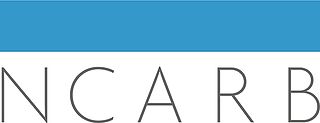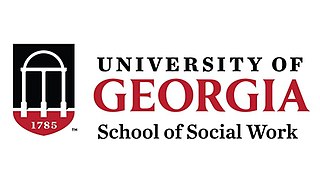
A registered nurse (RN) is a nurse who has graduated from a nursing program and met the requirements outlined by a country, state, province or similar government-authorized licensing body to obtain a nursing license. An RN's scope of practice is determined by legislation, and is regulated by a professional body or council.
Postgraduate education involves learning and studying for academic or professional degrees, academic or professional certificates, academic or professional diplomas, or other qualifications for which a first or bachelor's degree generally is required, and it is normally considered to be part of higher education. In North America, this level is typically referred to as graduate school.
A Bachelor of Education (B.Ed.) is an undergraduate professional degree which prepares students for work as a teacher in schools. In some countries such as Tanzania and Kenya, additional tasks like field work and research are required in order for the student to be fully qualified to teach. It may also be accompanied with or followed by tests for licenses or certifications required for teachers in some areas.

A graduate school is a school that awards advanced academic degrees with the general requirement that students must have earned a previous undergraduate (bachelor's) degree. A distinction is typically made between graduate schools and professional schools, which offer specialized advanced degrees in professional fields such as medicine, nursing, business, engineering, speech–language pathology, or law. The distinction between graduate schools and professional schools is not absolute since various professional schools offer graduate degrees and vice versa.
A teacher-librarian or school librarian or school library media specialist (SLMS) is a certified librarian who also has training in teaching.
The specialist degree is an academic degree conferred by a college or university. The degree is formatted differently worldwide and may be either a five-year program or a doctoral level graduate program that occurs after a master's degree but before a doctoral degree.
The Master of Education is a master's degree awarded by universities in many countries. This degree in education often includes the following majors: curriculum and instruction, counseling, school psychology, and administration. It is often conferred for educators advancing in their field. Similar degrees include the Master of Arts in Education and the Master of Science in Education.

The New York State Education Department (NYSED) is the department of the New York state government responsible for the supervision for all public schools in New York and all standardized testing, as well as the production and administration of state tests and Regents Examinations. In addition, the State Education Department oversees higher education, cultural institutions such as museums and libraries, vocational rehabilitation, and the licensing of numerous professions. It is headed by the Board of Regents of the University of the State of New York (USNY) and administered by the Commissioner of Education.

The National Council of Architectural Registration Boards (NCARB) is a nonprofit corporation comprising the legally constituted architectural registration boards of the 50 states, the District of Columbia, Guam, the Northern Mariana Islands, Puerto Rico, and the U.S. Virgin Islands as its members. Its mission is to collaborate with licensing boards to facilitate the licensure and credentialing of architects to protect the health, safety, and welfare of the public.
Licensed Professional Counselor (LPC) is a licensure for mental health professionals in some countries.

The College of Education at the University of Illinois Urbana-Champaign was founded in 1905. The college offers undergraduate, graduate, and online programs in areas including elementary education, early childhood education, special education, and Educational Organization and Leadership. It began with six departments; three of them merged and formed the largest department in the college. All departments offer masters and doctoral degrees. However, only two departments offer undergraduate degree programs: Special Education and Curriculum & Instruction. The college also offers 16 online programs. Students seeking an undergraduate degree in the college must meet the minimum graduation requirement set forth by the university. To obtain a certification, students must also meet the requirements of the Council on Teacher Education, a professional educational administration at the University of Illinois. The total enrollment is 1,361 students as of 2015.

The University of Georgia School of Social Work (SSW) is a college within the University of Georgia (UGA) in Athens, Georgia, United States.
Student teaching is a college-supervised instructional experience; usually the culminating course in a university or college undergraduate education or graduate school program leading to teacher education and certification. Examples of programs include Early Childhood, Middle Childhood, and Adolescence to Young Adult. It is required by those earning either a Bachelor of Education or Master of Education degree, as well as liberal arts Bachelor of Science or Bachelor of Arts degrees with a major in education.
The Master of Arts in Teaching (MAT) or Master of Science in Teaching (MST) degree is generally a pre-service degree that usually requires a minimum of 30 semester hours beyond the bachelor's degree. While the program often requires education classes in order to meet state license requirements, it emphasizes advanced coursework in a specific academic discipline to enhance one's knowledge in that subject area. Furthermore, it focuses on educating the candidate in practical teaching skills for use as a teacher as opposed to focusing on performing research in the educational field. Candidates usually spend a semester as a full time student teacher in order to earn the degree. There are two general models that degrees follow: a 5th year model, in which students spend one year extra beyond their bachelor’s degree to earn a master's degree and an initial teaching license, or a "Flex" program, which usually offers part-time weekend and evening courses to accommodate professionals who are changing careers. Some universities title this degree Master of Arts in Education.
A licensed clinical professional counselor (LCPC) is a professional who has been qualified to provide psychotherapy and other counselling services. LCPCs are trained to work with individuals, families, and groups to treat mental, behavioural and emotional problems and disorders. The main goal of LCPCs is to use counselling strategies to help people live a more satisfying life, which typically involves identifying a goal and finding potential solutions.
A student teacher or prac teacher is a college, university or graduate student who is teaching under the supervision of a certified teacher in order to qualify for a degree in education.

A certified teacher is an educator who has earned credentials from an authoritative source, such as the government, a higher education institution or a private body or source. This teacher qualification gives a teacher authorization to teach and grade in pre-schools, primary or secondary education in countries, schools, content areas or curricula where authorization is required. While many authorizing entities require student teaching experience before earning teacher certification, routes vary from country to country.
The basic requirement for pharmacists to be considered for registration is often an undergraduate or postgraduate pharmacy degree from a recognized university. In many countries, this involves a four- or five-year course to attain a bachelor of pharmacy or master of pharmacy degree.
In the United States education system, School Psychological Examiners assess the needs of students in schools for special education services or other interventions. The post requires a relevant postgraduate qualification and specialist training. This role is distinct within school psychology from that of the psychiatrist, clinical psychologist and psychometrist.
A graduate certificate is an educational credential representing completion of specialized training at the college or university level. A graduate certificate can be awarded by universities upon completion of certain coursework indicating mastering of a specific subject area. Graduate certificates represent training at different levels in different countries and can be at bachelor's degree or master's degree level.






